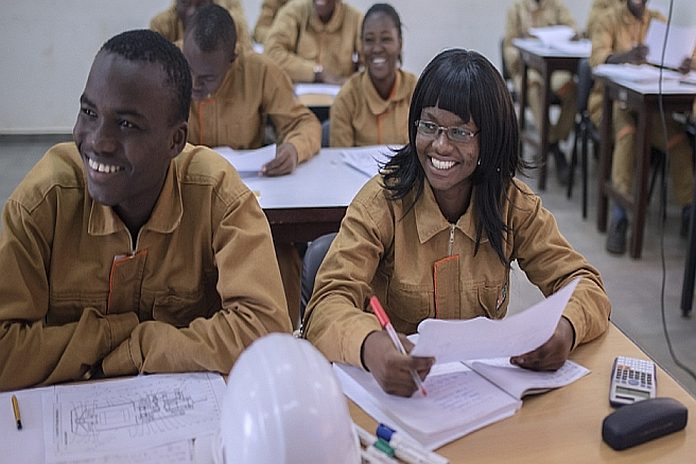By Martin Spicer and Franck Bousquet
Fragility, conflict, and violence (FCV) threaten to derail significant progress that has been made in improving living standards and reducing poverty over the past decades. While extreme poverty is going down around the globe, it is increasing in countries impacted by fragility and conflict. The World Bank estimates that by 2030, almost half of the world’s poor will live in countries facing FCV challenges.
In countries affected by fragility, conflict, and violence, the private sector plays a critical role in providing jobs and income. Inclusive and sustainable economic growth can also help heal grievances stemming from economic exclusion. These countries likely already face high levels of public sector debt, so private sector investment can bring an infusion of capital without increasing the debt burden. But these volatile environments struggle greatly to attract and sustain the long-term private sector investment that is needed to help them break the “fragility trap.”
The World Bank and the International Finance Corporation (IFC) have made supporting stability and inclusive growth in fragile situations a top priority. As the largest global development institution focused exclusively on the private sector in developing countries, IFC has committed to delivering 15-20 percent of its program to countries classified by the International Development Association (IDA) as “low income” and “fragile and conflict-affected situations” by 2030.
But the risks of working in fragile contexts are abundant and diverse. There can be regulatory and market uncertainty, weak sponsor capacity, and limited infrastructure and supplies. These projects thus require a much heavier lift in the areas of integrity due diligence, capacity building, regulatory reform, assistance with project development, and environmental advisory services.
These complex challenges require creative solutions, and the World Bank, IFC, and MIGA are working together to find innovative ways to support private sector investment in a range of FCV contexts.
In cases where countries affected by FCV have governments that are committed to reform, a broad range of private solutions is possible, including support to SMEs and value chains, local, regional and international companies, and infrastructure investments, with attention to inclusion and broadening the investor base. This was the case in Côte d’Ivoire, where the IFC has supported a significant number of investments since the end of the 2010-2011 post-electoral war.
For the most fragile situations, the local private sector still needs to be supported as these businesses are important for continuing economic opportunity. Inactive conflict, opportunities for private sector engagement are much more limited, but efforts can focus on advice or financing for smaller companies. In Yemen, IFC advisory services helped Al Kuraimi Islamic Microfinance Bank successfully launch a mobile-banking platform that allows its clients to access money when they can’t access a physical bank branch.
In countries where conflicts are contained in certain regions, extensive investment and advisory support in stable areas is still possible, for example, in places such as Afghanistan and Iraq where IFC has investments in agribusiness, power, financial services, and renewable energy.
While IFC has stepped up its efforts to increase its engagement in fragile situations, supporting the private sector in FCV contexts is complex and requires active market creation through project development, regulatory reform, and capacity building.
IFC has been developing a growing toolkit of approaches and instruments to address the challenges in FCV environments: establishing upstream units to identify and develop opportunities where IFC can have impact; advisory services focused on improving the investment climate and viability of investments supported by IFC; and use of “blended concessional finance”, such as the IDA private sector Window, to help provide concessional financial support to a high-impact project that would not attract funding on strictly commercial terms because the risks are considered too high.
And internal shifts are also being made including the recruitment of staff in FCV countries and aligning incentives to support this challenging but rewarding work.
Addressing the key drivers of conflict and staying engaged in areas of active conflict to preserve institutions and human capital, are part of our effort at the World Bank Group to bring a development approach to FCV challenges. To systematize this institution-wide, we are developing the first WBG FCV strategy that brings together the public and private sector arms of the Group to help us be more effective in addressing the FCV challenge.
In the first phase of consultations on the strategy, we have heard from over 1,700 stakeholders in 88 countries and territories, through face to face meetings, our online questionnaire, by email and through social media. Many observations focused on how to stimulate the private sector in FCV contexts and build the formal economy, especially by investing in local small and medium-sized enterprises.
The link between economic development and in particular job creation and stability was repeatedly emphasized, as well as the need for more robust underwriting of risk to encourage investment in FCV contexts.
The road ahead is challenging, and we will need to make adjustments along the way. We will continue to listen, learn, understand, and incorporate approaches and instruments that could be effective in engaging the private sector in countries impacted by fragility and conflict, knowing that what works in one country may be completely unsuited to another. As we move toward adoption of the institutional strategy on FCV, we are committed to remaining nimble and flexible as we work to meet the ambitious target we have set for ourselves.
![]()






